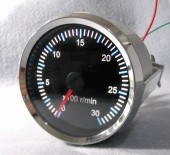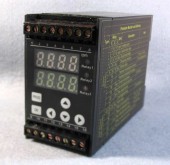| Guidance 指路人 g.yi.org |
software / rapidq / Examples / File & Directory / QIniFile / ReadMe.Doc.txt |
|
QIniFile: QIniFile allows a RapidQ program to read/write/edit an .ini file Version 1 In Chapter 10.6 of the RapidQ documentation, there is reference to making a custom Inifile object. I didn't see anything like it within the RapidQ files section so it seemed appropriate to supply such. I hope it is of some value. I recognize that a more complete editing system can be produced but the value of QIniFile is that it is to be utilized within a RapidQ program. Feel free to design your own. I used the win.ini file as an example to explain QIniFile's properties, etc. Please DO NOT play around with this file. The WINDOWS OS can become quite inoperable when it is ill-configured. Version 1.1 I have fixed a couple of documentation errors and added a way to reference the RapidQ.ini CONST variables. This can be valuable if you are using them in a configuration file, ie: Formcolor=clBlue. The value of clBlue would be zero because it is read in as a string. To overcome this, your program will need: MyColorString = MyIniFile.ReadEntry(MySection,Formcolor] MyColorValue = RQValue(MyColorString) or more simply... MyColorValue = RQValue(MyIniFile.ReadEntry(MySection,Formcolor)) To use this function, your program must FIRST call the sub RQStart which reads in the RAPIDQ.Ini file and initializes the arrays RQWORDS and RQValues. You need to do this only once, preferably near the beginning of your program. RQStart needs one parameter - the exact file name you have given your 'RapidQ.inc'. Study the code and you will see that it reads only the CONSTs and ignores all comments, etc. Further, all hex values are changed to decimal. The only values NOT read in is the QBColor array. Add in your own CONSTs but beware that the RQWords and RQValues arrays are presently set to 450. This can easily be changed. If you are using RapidQ.inc's CONSTs within your program, and you probably are, you still must $Include <RapidQ.inc>. Version 1.2 The QIniFile.WriteSection can add empty lines depending on where it is being written in the .ini file. To correct this I coded a small segment '.ClearEnding' which is used internally within the program. When referencing the 'Entry' I changed the LEN concept to an Equ$ function to ensure that a 'Section' search could not mis-interpret an 'Entry' and vice versa. I also completly recoded the RQValue making it simpler to use. No size parameter is needed to start. Just add in: Create RConst As RQConst FileId = "QLibrary.Inc" Initialize End Create Utilize by RConst.ValueOf(Const) to get a numerical value. It wiil also 'Execute' the RapidQ's RGB so that something like "CONST clYellow = RGB(255,255,000)" will result in the appropriate numerical value. Contact: StarBase12@MyRealBox.com Included Files: Readme.Doc <==== You are reading it. QLibrary.inc <==== A beginning effort to organize my own programming routines, functions, etc. which includes QIniFile. If someone knows a better way of coding I'd appreciate knowing how. QLibrary.ini <==== Has one entry which QIniFile uses to identify an editor for itself. Currently set to Notepad.exe. The whole RapidQ defaults could read in via QIniFile to customize one's own projects. QIniFile Properties: Field Type Description Name String IniFile name Lines QStringList IniFile section read LineCount Integer IniFile section No. of Lines (Use for READ ONLY!) QIniFile Methods: Method: ClearEnding Type: Sub Description: Clears QIniFile.Lines of empty linefeeds Example: None needed. Used internally Method: AddBrackets$ Type: Function(Section As String) As String Description: Adds [] if needed, used internally within QIniFile Example: MyVariable$ = AddBrackets$("Desktop") results to "[Desktop]" Method: ReadEntry Type: Function(Sections As String,KeyWord As String) As String Description: Returns the [Section] keyword entry Example: MyVariable$ = ReadEntry("Desktop","Wallpaper") results to "(None)" Method: ReadSection Type: Sub(Section As String) Description: Reads in an entire [Section] to the QIniFile.Lines Example: ReadSection("Desktop") results to "Wallpaper=(None)","TileWallpaper=0","WallpaperStyle=2","Pattern=(None)" Method: WriteEntry Type: Sub(Section As String, KeyWord As String, Entry As String) Description: Writes the [Section] KeyWord=Entry to the Inifile. Example: WriteEntry("Desktop","TileWallpaper","1") results to the Inifile having "[Desktop]" with "TileWallpaper = 1" Method: WriteSection Type: Sub(Section As String, SectionList As QStringList) Description: Writes the entire [Section] & SectionList to the Inifile. Example: WriteSection("Desktop",SectionList) Method: Edit Type: Sub Description: Brings up a user defined editor to access the Inifile. (See QLibrary.ini) Example: Edit QIniFile Events: NONE Sample code: $INCLUDE <RAPIDQ.INC> ' From William Yu (Rapid-Q Creator) $INCLUDE <QLIBRARY.INC> ' This could easily be added into the RAPIDQ.INC instead ' but it is too easy to 'accidently' change something... ' Adage: If it works don't touch it! Declare Sub SaveToMyFile Declare Sub CopyToMyEdit Dim MySectionContent As QStringList Dim I As Integer Create MyForm As QForm Create MyEdit As QRichEdit End Create Create SaveButton As QButton Align = alNone Height = 24 Width = 100 Top = 0 Left = 212 Caption = "SAVE" OnClick = SaveToMyFile End Create Center End Create Create MyIniFile As QIniFile Name = "C:\Windows\Win.ini" ReadSection "Desktop" End Create CopyToMyEdit MyForm.ShowModal Application.Terminate '-----------------Sub Routines------------------- Sub CopyToMyEdit For I = 0 To MyIniFile.LineCount - 1 MyEdit.AddString MyIniFile.Lines.Item(I) Next I End Sub Sub SaveToMyFile MySectionContent.Clear For I = 0 To MyEdit.Linecount -1 MySectionContent.AddItems MyEdit.Line(I) Next I MyIniFile.WriteSection "Desktop",MySectionContent End Sub '**********************EOF************************* Note: QIniFile uses Trim$, CatStr$, Equ$ functions which are included in the early subroutines. The RQValue function utilizes a StrSeach function which is also coded in earlier. '*************************************End Of ReadMe.Doc*************************** |
|
| © Wed 2026-2-18
Guidance Laboratory Inc. Email:webmaster1  g.yi.org Hits:0 Last modified:2003-01-15 20:37:56 g.yi.org Hits:0 Last modified:2003-01-15 20:37:56
|
 |
|||
|
|
 搜索
搜索 论坛
论坛 Home
Home 回顶部
回顶部







